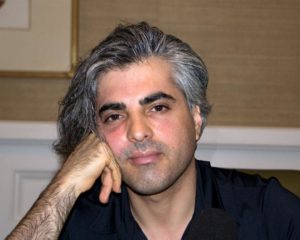Click here to listen to the interview.

Feras Fayyad, San Francisco, CA 10/7/19
When I spoke with Feras Fayyad on 0ctober 7, 2019, I started with whether or not the Syrian filmmaker had had any trouble getting into the United States. An irony in retrospect considering the difficulties he is currently encountering entering the United States (sign the petition to allow him in here).
My question prompted him to discuss the issues he has faced over the years with his own government over the documentaries he has made. We went on to talk about his imperative to tell stories that don’t put the Assad regime in the best light, and that put him in the same harm’s way as his subjects, as well as why coming from a family where women were the majority made telling the story of women doctors in a war zone doubly important for him.
His film is an immersive experience showing footage of unseen in this country of the effects of the sustained bombing of al Ghouti, where the population has been forced underground, and where a heroic group of women doctors, led by Dr. Amani Ballour, struggle to treat patients, and to maintain their own equilibrium in a place where buying salt can be a political act. Our conversation covered his own experiences as a child being bombarded by chemical weapons, and later, as an adult, listening to the screams of women being tortured when he was imprisoned and tortured himself.
Fayyad’s word of choice for Dr. Ballour is “extraordinary”, and the more he talked about filming and getting to know her, the more obvious that it’s a word that only begins to describe her: a woman with a revolutionary world view in a country where women can be treated as little more than chattel. We also touched on the role of any fundamentalist religion or philosophy in oppressing women, and where people can get involved to help the most vulnerable victims of concerted, targeted attacks by both Syrian and Russian regimes.
Fayyad’s previous work includes the Oscar®-nominated documentary LAST MEN IN ALEPPO,
Your Thoughts?